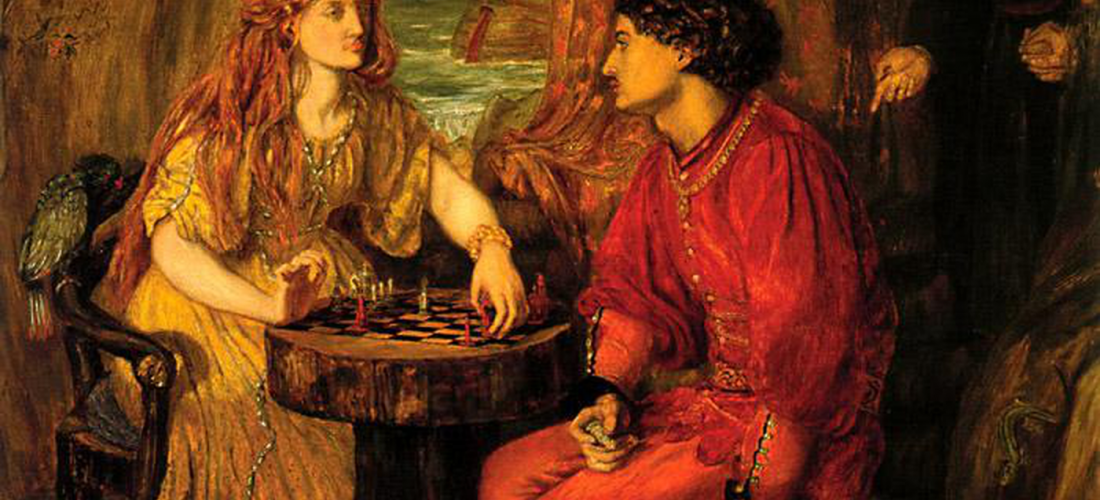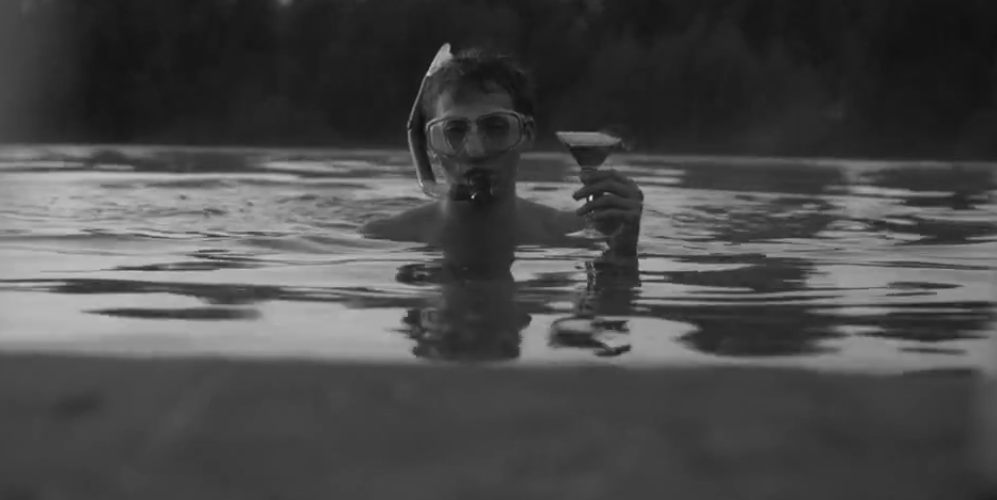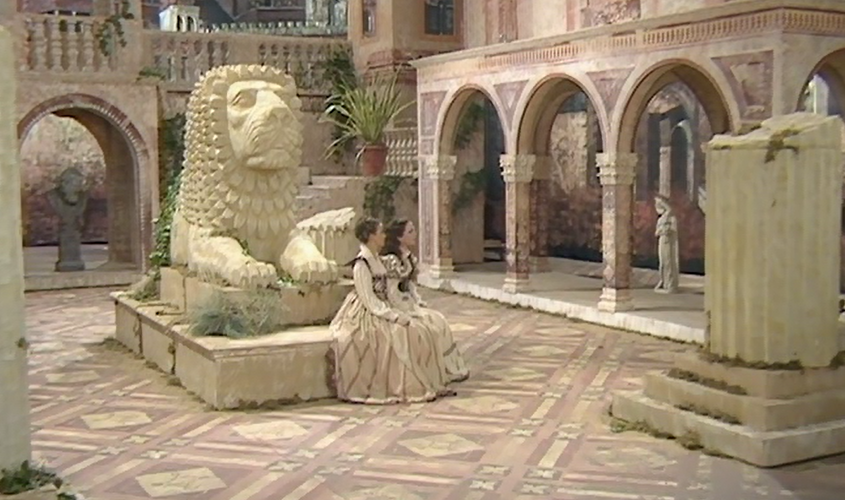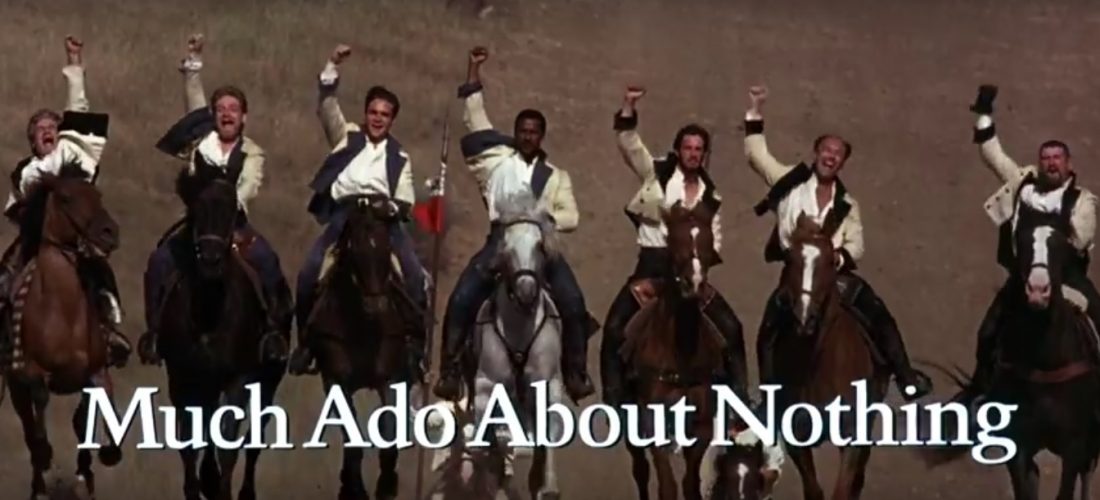This week’s version of Much Ado About Nothing is a BBC classic, released in 1984 as part of their efforts to film all of Shakespeare’s plays. It was one of the last, despite being scheduled to air in 1978 at the beginning of the mammoth Shakespeare-athon that the BBC organised. Why? Well, as it turns out, there was an entire other version shot with Penelope Keith from The Good Life, but that version was canned and a whole new Much Ado was shot with a different cast.
And what a cast! The bloke from My Family, Lance Corporal Jones from Dad’s Army and that woman who was on Strictly Come Dancing once all make appearances here. And what did Kate, Kosi and I think of it? Well…it’s a much more staid affair than the Branagh – it’s actually quite hard to imagine anyone having any sort of naughty business in this version of Messina, so the idea of Hero having too much is similarly a stretch. But, without further ado (about nothing), here is Much Review About Nothing: The BBC Edition.
And after a very long and stately title sequence, we are off! Gosh, that is an enormous lion. Not live, sadly, but very square and looks distinctly Styrofoam.

How does that hat even stay on his head?
What is the point of the Messenger’s hat? It’s literally defying gravity here, hanging onto 75% of the side of his head, and it’s definitely not keeping any other part of his head warm.
I see this production also belongs to the well worn tradition of giving Hero as few lines as possible, because everyone knows that silence = chastity.
We’re five minutes in and already Cherie Lunghi as Beatrice is carrying most of this scene. Everyone else seems to have got the memo to look like you’re mentally planning a dinner party for once this day’s filming is done.
The men have entered! No horses or shouting in this version, just a casual stroll through the fakest orchard I have ever seen, against the least realistic landscape of Messina anyone has ever painted. But I suppose this was the second time round so maybe they were cutting corners on this one.

You have to admit there is a striking resemblance
Robert Lindsay as Benedict with the beard and the moustache bears a striking resemblance to Robin Hood from the first Shrek film.
He also has an incredible blusher on. Damn, Benedict. That blusher is poppin’.
Lunghi and Lindsay almost feel like they’re overacting in this moment, but I think it’s probably because they are the only two who are actually acting. Everyone else in the background has been deactivated into a sort of standby, BBC-actors-doing-Shakespeare stock pose.
I also appreciate that Lindsay is playing Benedict angrier than is the norm – it places him on an interesting line between clown and actually cruel that people often miss in the character.
This version of Claudio, played by Robert Reynolds, appears to have forgone emotion in favour of more buckles on his fancy red leather doublet. There are definitely more buckles than facial expressions in this scene from him.
Hey, they’ve left in the scene which is basically never done, where Antonio tells Leonato things we all already know. But dammit, the BBC is nothing if not faithful to the text, often at the detriment of pace, entertainment and technical aptitude.
Leonato’s costumes are all fabulous here, but this one in particular is reminiscent of a fancy dress Pope outfit.
And we’re back in the cellar again for Don John! Seriously, guys, let the poor man have some sunlight. Maybe he’s not evil, just suffering from Seasonal Affective Disorder.
The baddies have been colour coded for our convenience, so it’s nice and easy to identify accomplices. Such as Conrad, who in this version looks like a budget Alan Rickman from Robin Hood: Prince of Thieves.
Nobody has moved more than their chin for the last five minutes. I assume this is a rule for BBC Shakespeare, to emphasise how seriously they take it.
Why does everyone in Shakespeare insist on walking around in straight lines at parties?! We’ve been through this; it’s neither practical nor comfortable, it just makes you look like you’re lining up for a particularly vicious game of British Bulldog.
Also – the extra in the green dress on the back row just nearly fell over. She styled it out like some Renaissance-y dance move though so it’s OK.

We interrupt this serious period Shakespeare to bring you that bit from Insidious where they’re all in some kind of circus hell
THOSE MASKS. I’m going to have actual nightmares.
We’re 20 minutes in and Hero has just had her first line. Happy days. She said it with such enthusiasm; it’s like she knows she won’t get many more.
These dances have so much hopping in them. Is this something we’re missing out on? Should someone restart a hopping craze for the 21st Century?
Kate has quite correctly pointed out that the man in the background has an enormous drum (oo-er) but no apparent intention of playing it. There are also more Styrofoam lions dotted about the place like very regal trip hazards.
I think Benedict is drunk. Or maybe Robert Lindsay was, and couldn’t be bothered to wait til he was sobered up to film. They did this thing in a week, you know. No time to wait around for sobriety. He’s also flagrantly breaking the fourth wall here, which is a little disconcerting as it’s less House of Cards style suave, and more manic.
“You, who have stolen his bird’s nest” – and by bird’s nest, he does mean vagina. Naughty.
Also, for a big, mean and scary villain, Don John’s villainous efforts have so far added up to upsetting Claudio a little bit over a small misunderstanding at a party, which is a big deal in Jane Austen and rather less impressive here. He’s no Iago.
Does Claudio still know he’s in shot? It looks like he’s been put onto standby mode again and is staring blankly in the corner of the screen. He’s so unresponsive that Leonato basically attaches Hero to him before he gives any sign of life.
They then have a very awkward first kiss while Leonato stands way to close to them. Dude. Personal space. They’re trying to hatch their first emotion together.
We slow fade into a closeup of Don John as he realises that his first plan was neither very effective, or even particularly evil. Meanwhile, Borachio is acting pretty much exclusively through his eyebrows. If they go any lower, they might actually swallow the rest of his face up. Where is Keanu Reeves when you need him? “Too slippery to stay in shot” – Kosi.
And we’re back in the orchard for the famous tricking scenes! Maybe this is where the pace will pick up?
I have no idea what game Benedict is are supposed to be playing with oranges. The fact that they are being used as balls confirms my suspicion that everything in this orchard is fake, and probably a prop from a previous BBC Shakespeare though.
He’s also definitely undone his shirt quite some way since the first scene.
Oh, now he’s thrown, attempted to catch and dropped the orange rather anti-climatically. That was probably a mistake but heaven forbid anyone reshoots a scene here. Instead, it shall remain where it is while Benedict goes back to breaking the fourth wall. It’s like he’s the only one who knows about the Matrix.

Goodness me, that is an enormous lute. Not an innuendo.
This scene is being played like a Parents Evening Meeting, as Don Pedro, Leonato and Claudio very solemnly discuss how disappointed they are in Benedict. Guys. Up the pace a little. Or maybe try a new emotion. Is there an expansion pack that only Beatrice and Benedict got loaded with?
Claudio is continually wandering in and out of shot, sort of like his programming has malfunctioned. He keeps pausing like he’s a Sim that just had an action cancelled.
Benedict is so shocked at these (very somber) revelations that he’s dropped yet another fake orange. Also, his shirt is so low now that there is a very real danger of a nip slip.

We interrupt this Elizabethan comedy to bring you Oliver Twist
Benedict appears to have caught the Parents Evening bug, as his delivery of most of his most famous monologue comes across less like excitement and romance, and more like lesson planning for a Year 8 Maths class. “The world must be peopled” is usually a hysterical line, and it sadly falls very, very flat here.
Oh dear. The BBC have been faithful to the point of leaving in all of the racism and antisemitism that is usually quietly disposed of.
We’re onto the next tricking scene and Hero has some lines! She’s determined to make the most of them too, and has dressed as a giant yellow napkin to make sure she is the centre of attention. Ursula, meanwhile, is modelling something which looks a bit more like you could buy it for an exorbitant price from Urban Outfitters.
Beatrice has been successfully tricked, and is also now breaking the fourth wall. Maybe it’s an achievement to unlock – once you’ve felt more than four emotions, you reach level two and become aware of the cameras. At level four, you realise that the entire orchard is fake and you are in fact on a cheap soundstage.
We’re in some sort of drawing room now, and it looks like it’s been filled up with all of the spare props from old history documentaries. I think Don Pedro has a game going where he tries to touch each one before the scene is over, as he’s worked his way through two silver goblets and a decorative globe within two lines.
Claudio has come dressed as the sort of gift bag that you put wine in.
This scene contains a much smaller lute than before. Still not an innuendo.
I’m also not sure Benedict has seen one before as he’s holding it by the neck and swinging it ineffectually.
Don John has literally popped out of thin air, and Don Pedro is so surprised by this that he dribbles into his beard. This is some high brow film making here.
This scene is actually played in a really interesting way as Claudio is far angrier with Don John than with Hero. Which makes an awful lot of sense given that it’s not only upsetting to Claudio, it’s also pretty offensive to the woman he loves to suggest that she is immoral. It still suffers from being played incredibly slowly, though.
Claudio throwing water over Don John is a neat bit of direction, but would have been more effective if it looked like it was done out of anger, rather than just because he had a programming malfunction and lost control of his arm.

We interrupt this sunny Italian setting to bring you the long lost music video for We Three Kings of Orient Are
Clive Dunn’s beard is no less majestic for being visibly fake.
Borachio and Conrad have arrived to drunkenly spill some secrets. Except that I’ve never seen two supposedly drunk people look more sober. Perhaps all of these scenes have gone on so long that they were drunk to begin with, but have since had time to sober up.
There’s not been an ornamental lion for a few scenes and I’m starting to miss them. A relic of happier scenes.
It’s time for the wedding and everyone has their shiniest clothing on. Claudio has gone to the effort of stapling a large ornamental tablecloth to his back, which is surprising given that he knows this wedding is a no-go.
Claudio is now casually renouncing Hero for maybe having sex with the man with the powerful eyebrows. Everyone is quite sedate about this. The extras are very calmly filing out of the church, probably to take advantage of the free banquet before it all gets put away.
Kudos to the director – they have at least left Hero’s lines in this scene rather than have her faint more or less on the spot, which is cool. And she is making the most of them to display a full three emotions, two and a half more than Claudio.
Oh no, I tell a lie – Claudio just had a big shout! A whole feeling, just to himself! Admittedly it lasts for two seconds, then he returns to standby and stares blankly into space again.
There is so little movement in this entire film that Hero fainting in the middle of the church actually feels like a jump scare.
Meanwhile, Benedict is hovering in the corner of the scene like a morally upright, wisecracking Quality Street chocolate in his shiny red and gold wedding get up.
The chapel scene in this version is darker than in others, perhaps because they’ve been a bit more bitter and less light hearted about their relationship in previous scenes. It’s less sweet and more tense but actually works well with that, and the lack of a kiss where it is traditionally placed is a sensible omission since it keeps this tension up. It’s a shame that the rest of the film can’t sustain the darker mood.
We’re back to the prison and the Sexton is not even pretending to write anything down; he’s just wiggling his prop quill over his prop parchment with no intention of making contact. Budget Alan Rickman looks utterly fed up and Clive Dunn’s beard has somehow gotten even less convincing.
The giant lion is back! I am pleased.
Pretty much all of the characters are wearing black now, and although there may be a more practical reason like mourning colours or whatever, I prefer the idea that Don John has unintentionally started a new craze for Scandinavian chic, 500 years before the rest of us caught on.
Well, that escalated quickly. What is usually played as a small spat between Antonio and Claudio has turned into Antonio chasing him around the giant lion with a visibly plastic sword. Where was this passion for the rest of the play? Maybe we just need more Antonio in our lives.
The watch have arrived to resolve the whole conundrum, and Verges appears to have become aware of the audience as well! Unless Clive Dunn just forgot he wasn’t supposed to be looking at the camera.

We interrupt this family friendly production to bring you Final Destination 7: Shakespeare’s Revenge
How did they manage to smuggle a brass band into the funeral? It’s like a really macabre version of the opening scene in Love Actually.
We’re into the final scene and everyone is wearing colours again! Perhaps most conspicuously, Don Pedro is dressed like a really fabulous set of road markings, accompanied by a bedazzled man bun.
I suppose it would be too much to hope for a few more emotions this late in the game, and true to form, Claudio’s reaction to the love of his life being mysteriously resurrected is one of mild confusion and apathy.
But never mind that because, in true Elizabethan style, this adaptation ends with couples alternately hopping erratically and making out.
Scenes with Conspicuous Styrofoam Lions: A staggering 23 scenes
Not Cricket Rating: It’s not really cricket. There are redeeming features but it’s just a bit too slow and staid to be considered entertaining.


































